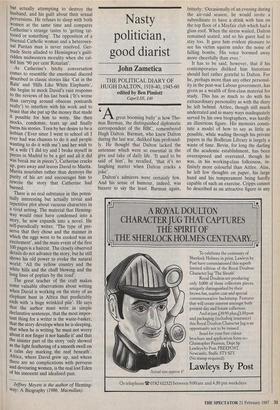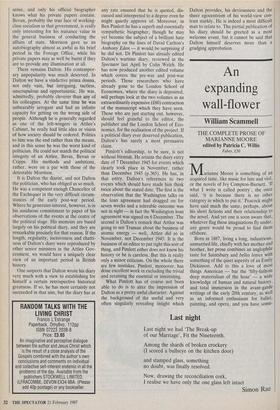Nasty politician, good diarist
John Zametica
THE POLITICAL DIARY OF HUGH DALTON, 1918-40, 1945-60 edited by Ben Pimlott
Capel LSE, f40
'A great booming bully' is how Tho- mas Barman, the distinguished diplomatic correspondent of the BBC, remembered Hugh Dalton. Barman, who knew Dalton during the last war, disliked him profound- ly. He thought that Dalton lacked the antennae which were so essential in the give and take of daily life. 'It used to be said of him', he recalled, 'that it's no laughing matter when Dalton cracks a joke'.
Dalton's admirers were certainly few. And his sense of humour, indeed, was bizarre to say the least. Barman again, bitterly: 'Occasionally of an evening during the air-raid season, he would invite a subordinate to have a drink with him on the top floor of a Mayfair club which had a glass roof. When the sirens wailed, Dalton remained seated, and so his guest had to stay too. It gave him evident pleasure to see his victim squirm under the noise of falling bombs. His voice boomed away more cheerfully than ever.'
It has to be said, however, that if his contemporaries disliked him historians should feel rather grateful to Dalton. For he, perhaps more than any other personal- ity in the post-war Labour government, has given us a wealth of first-class material for study. This has as much to do with his extraordinary personality as with the diary he left behind. Attlee, though still much underrated and in many ways inadequately served by his own biographers, was hardly an illustrious figure. His memoirs consti- tute a model of how to say as little as possible, while wading through his private papers in the Bodleian Library is largely a waste of time. Bevin, for long the darling of the academic establishment, has been overexposed and overrated, though he was, in his working-class folksiness, in- finitely more colourful than Attlee. Alas, he left few thoughts on paper, his large hand and his temperament being hardly capable of such an exercise. Cripps cannot be described as an attractive figure in any sense, and only his official biographer knows what his private papers contain. Bevan, probably the true face of working- class socialism in that government, is really only interesting for his nuisance value in the general business of conducting the affairs of state. Morrison gave us an autobiography almost as awful as his brief period in the Foreign Office, while his private papers may as well be burnt if they are to provide any illumination at all.
There remains Dalton. His contempor- ary unpopularity was much deserved. In Dalton we have a vindictive prima donna, not only vain, but intriguing, tactless, unscrupulous and opportunistic. He was, admittedly, probably cleverer than any of his colleagues. At the same time he was unbearably arrogant and had an infinite capacity for getting on the wrong side of people. Although he is generally regarded as one of the left-wingers in Attlee's Cabinet, he really had little idea or vision of how society should be ordered. Politics to him was the end rather than the means, and in this sense he was the worst kind of politician. He could not match the political integrity of an Attlee, Bevin, Bevan or Cripps. His methods and ambitions, rather, were on a par with those of the detestable Morrison.
It is Dalton the diarist, and not Dalton the politician, who has obliged us so much. He was a competent enough Chancellor of the Exchequer in the very difficult circum- stances of the early post-war period. Where he generates interest, however, is in his assiduous commitment to paper of his observations of the events at the centre of the political stage. His memoirs are based largely on his political diary, and they are remarkable precisely for that reason. If the length, regularity, incisiveness and chatti- ness of Dalton's diary were reproduced by other senior ministers in the Attlee Gov- ernment, we would have a uniquely clear view of an important period in British history.
One suspects that Dalton wrote his diary very much with a view to establishing for himself a certain retrospective historical greatness. If so, he has most certainly not succeeded in that aim, but the diary has at any rate ensured that he is quoted, dis- cussed and interpreted to a degree even he might quietly approve of. Moreover, in Ben Pimlott he has a superb and essentially sympathetic biographer, though he may yet become the subject of a brilliant hate biography on the lines of David Carlton's Anthony Eden — it would be surprising if he did not. Dr Pimlott has already edited Dalton's wartime diary, reviewed in the Spectator last April by Colin Welch. He has now produced another edited volume which covers the pre-war and post-war periods. Those researchers who have already gone to the London School of Economics, where the diary is deposited, will perhaps look at the two volumes as an extraordinarily expensive (f8o) contraction of the manuscript which they have seen. Those who are just starting out, however, should feel grateful to the editor, the publisher and the London School of Eco- nomics, for the realisation of the project. If a political diary ever deserved publication, Dalton's has surely a most persuasive claim.
Pimlott's editorship, to be sure, is not without blemish. He retains the diary entry date of 7 December 1945 for events which clearly took place in November, rather than December 1945 (p.365). He has, in that entry, Dalton's references to two events which should have made him think twice about the stated date. The first is the observation that the Washington talks on the loan agreement had dragged on for seven weeks and a tolerable outcome was not in sight — in fact the Washington loan agreement was signed on 6 December. The second is Dalton's remark that Attlee was going to see Truman about the business of atomic energy — well, Attlee did so in November, not December 1945. It is the business of an editor to put right this sort of thing, and Pimlott either does not know his history or he is careless. But this is really only a minor criticism. On the whole there are few mistakes. Pimlott, moreover, has done excellent work in excluding the trivial and retaining the essential or interesting.
What Pimlott has of course not been able to do is to alter the impression of Dalton as a pretty awful character. Against the background of the useful and very often singularly revealing insight which Dalton provides, his deviousness and the sheer egocentrism of his world-view con- trast starkly. He is indeed a most difficult man to relate to. The partial publication of his diary should be greeted as a most welcome event, but it cannot be said that Dalton himself deserves more than grudging approbation.



















































 Previous page
Previous page